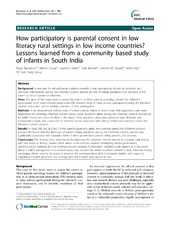How participatory is parental consent in low literacy rural settings in low income countries? Lessons learned from a community based study of infants in South India
Rajaraman, Divya; Jesuraj, Nelson; Geiter, Lawrence; Bennett, Sean; Grewal, Harleen M. S.; Vaz, Mario; TB Trials Study Group
Peer reviewed, Journal article
Published version
Permanent lenke
https://hdl.handle.net/1956/4625Utgivelsesdato
2011-02-15Metadata
Vis full innførselSamlinger
Originalversjon
https://doi.org/10.1186/1472-6939-12-3Sammendrag
Background A requisite for ethical human subjects research is that participation should be informed and voluntary. Participation during the informed consent process by way of asking questions is an indicator of the extent to which consent is informed. Aims The aims of this study were to assess the extent to which parents providing consent for children's participation in an observational tuberculosis (TB) research study in India actively participated during the informed consent discussion, and to identify correlates of that participation. Methods In an observational cohort study of tuberculosis in infants in South India, field supervisors who were responsible for obtaining informed consent noted down questions asked during the informed consent discussions for 4,382 infants who were enrolled in the study. These questions were post-coded by topic. Bivariate and multivariate analysis was conducted to examine factors associated with asking at least one question during the informed consent process. Results In total, 590 out of 4,382 (13.4%) parents/guardians asked any question during the informed consent process. We found that the likelihood of parents asking questions during the informed consent process was significantly associated with education level of either parent both parents being present, and location. Conclusions The findings have implications for planning the informed consent process in a largely rural setting with low levels of literacy. Greater effort needs to be directed towards developing simple participatory communication materials for the informed consent process. Furthermore, including both parents in a discussion about a child's participation in a research study may increase the extent to which consent is truly informed. Finally, continuing efforts need to be made to improve the communication skills of research workers with regard to explaining research processes and putting potential research participants at ease.
Utgiver
BioMed CentralOpphavsrett
Copyright 2011 Rajaraman et al; licensee BioMed Central Ltd.Rajaraman et al.

